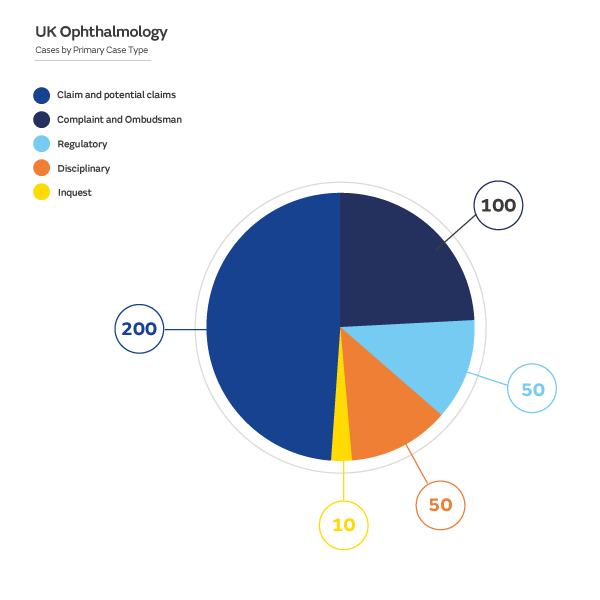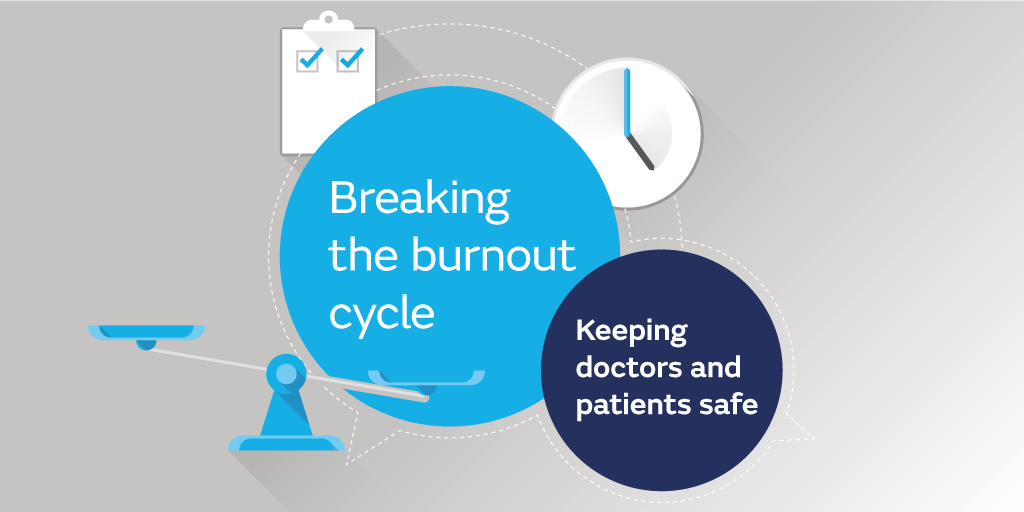Learning from cases: Ophthalmology
Post date: 22/05/2025 | Time to read article: 5 minsThe information within this article was correct at the time of publishing. Last updated 22/05/2025
Read this resource to:
- understand the claims environment in ophthalmology: Insights and lessons learned.
- receive tailored advice and key recommendations to help you reduce risks in the future.
Ophthalmology is a unique field, so the advice you receive needs to be equally specialised.
As a Medical Protection member, you benefit from more than 130 years of experience defending doctors and other healthcare professionals. That isn’t just a number – it’s more than 13 decades of specialist expertise that we use to protect you long into the future.
The team at Medical Protection, including medicolegal experts and cases and claims specialists, have delved into a huge range of ophthalmology cases to analyse the common reasons for claims and the different case types, to help keep you up to date with the current trends and provide insights into the ophthalmology claims and complaints landscape.
We hope you find this a useful source of guidance and advice, empowering you to protect yourself throughout your career.
Introduction
Ophthalmology is a surgical specialty where a wide range of patients with eye conditions are diagnosed and treated. Medicolegal cases are not uncommon due to the significant impact ophthalmological surgery can have on patients’ lifestyles.
The majority of cases reported to Medical Protection, 2006-2015, relate to elective eye surgical procedures undertaken outside the NHS. Patients who opt for elective surgery can choose to proceed with it at any time, or not at all. Many have the alternative option of staying in spectacles or contact lenses.
Claims in ophthalmology can sometimes lead to large financial settlements. The value of the settled claim will often include compensation for care and loss of earnings, if applicable, in addition to an award for the damage that resulted from a breach of duty. Complications can result in permanent, serious loss of vision (vision worse than the driving standard in the affected eye that cannot be corrected with spectacles or contact lenses). The value of each claim varies enormously, with our highest ophthalmology total case payment 2006-2015 (claimant damages, costs and legal costs), being well in excess of £1 million.
Analysis
We have analysed the support Medical Protection has provided UK-based ophthalmologists in relation to almost 700 cases. In addition to providing advice and assistance in writing medical reports in over a third of these cases, we have supported our members in relation to more than 400 claims (demands for monetary compensation, which embodies allegations of negligence), potential claims (intimations from a claimant of a possible claim for compensation), complaints, GMC investigations, local disciplinary procedures and inquests.
We have analysed all claims, including those defended, not pursued and settled.
Case Types

Claims: procedures and contributory factors
Laser vision surgery
The largest number of claims related to laser vision surgery. The majority of claimants suffered from a deterioration in their vision following the surgery, while some claimants had experienced complications following surgery, eg, infection. In a quarter of claims that were settled, there was evidence of inadequate consent. A quarter required further surgery. Our highest laser vision surgery total case payment was in excess of £1 million.
Cataract surgery/intraocular lens implants
The second most frequent claim reason was post-cataract surgery. Claimants frequently suffered deterioration in their vision and required further surgery. In a third of claims there was alleged failure to warn of complications, while a quarter alleged negligent cataract surgery, which led to complications, eg, retinal detachment after cataract surgery and chronic follicular conjunctivitis. Missed pre-existing diabetic retinopathy and incorrect lens implanted were also reported. Our highest cataract surgery/intraocular lens implants total case payment was in excess of £80,000. Following changes to the Personal Injury Discount Rate we would now expect damages to be significantly higher.
Intraocular lens (IOL) exchange
Frequent claims followed intraocular lens exchange surgery. In half of the cases analysed, there was alleged failure to obtain adequate consent. We are aware that pooling of patients for IOL operating lists does occur in some hospitals: as a consequence, the operating consultant may see their patients for the first time on the day of surgery. Placing a heavy reliance on trainee doctors or nurse specialists to take IOL measurements and patient consent, may have contributed to claims of incorrect lens insertion and inadequate consent.
Many claimants had suffered from blurred vision and underwent revision surgery, and there were allegations of a failure to correct eyesight. Complications included dry eyes and retinal detachments, and our highest IOL exchange surgery total case payment was in excess of £140,000.
Glaucoma
There were some claims alleging failure to diagnose, or appropriately manage, glaucoma. A lack of timely measurement of intraocular pressures was found to be the root cause in some settled cases.
Blepharoplasty
Dissatisfaction with the outcome following plastic surgery operations for correcting defects, deformities, and disfigurations of their eyelids is the commonest reason for bringing a claim after blepharoplasty.
Wrong lens implant
Despite this being classified as a ‘Never Event’ across the NHS, we continue to see claims arising from these.
Patient complaints: common themes
When we analysed patient complaints reported by ophthalmologists, there were similar themes:
- Unexpected outcomes following laser, cataract and lens exchange surgery – one of the precipitating factors was complainant dissatisfaction with the consent process.
- Failures and delays to diagnose – these include alleged missed retinal detachment, delay in referral for diagnosis of glaucoma and alleged failure to diagnose the cause of deteriorating vision.
- Poor manner and attitude during a consultation – some complainants reported being unhappy with their ophthalmologist’s manner and attitude, rudeness during the consultation and receiving inappropriate comments made by their specialist.
Regulatory (GMC) and disciplinary cases: common themes
Regulatory and disciplinary cases can come from patients, senior and junior colleagues, and can be related to clinical and non-clinical issues. Key themes from the Medical Protection caseload were:
- Performance concerns: operative skills, clinical judgment and communication
- Probity, eg, private practice in NHS time, allegedly exaggerated training experiences
- Inappropriate personal behaviour/misconduct/boundaries, and poor communication with colleagues
- Inappropriate delegation or supervision
- Member health issues
- Conduct around the reporting of incorrect lens insertion
- Alleged breach of contract/incorrect billing.
Ophthalmology in the UK: Top tips to minimise risk
Please note: this not an exhaustive list of recommendations, but key learning points from our analysis
- Ensure your surgical technique is regularly updated and in line with current best practice, such that it would be supported by your peers.
- Listen to what your patient would consider to be a successful outcome. Understand your patient’s concerns and expectations.
- Be honest and let your patient know if the surgery can give them the result they want or not.
- Discuss the possible benefits and risks of all potential treatment options. Consider what is most important to that individual, taking into account their current employment.
- Explain about frequent and serious complications and the implications for the individual patient if these occurred. Explain what you would do to correct complications, or if you failed to meet their expectations.
- Explain what the procedure will involve, the likely results, and when you will see them afterwards.
- Your patients should be given clear information about ALL the costs involved, and what their rights are to refunds/return of deposits if they change their mind after they have paid some or all of the costs.
- Never pressurise or rush patients into giving consent to have surgery (eg, by providing special offers that are for a limited time only, or any discounts in price).
- Double-check that the information has been understood and decisions are fully informed.
- For elective operations, always leave sufficient time (eg, at least a week) after the consultation before scheduling the procedure, to allow the patient time to think things through, talk to their family or access more information.
- Be aware that delegating the giving of advice and taking of consent for surgery increases the risk of patients taking action.
- Clearly document all the steps to provide evidence of a detailed interactive discussion; this is vital for legal purposes.
- Perform pre-surgical, verbal ‘time-out’ checks against medical records of:
- patient identity
- the eye to be operated on
- the proposed procedure
- drug allergies
- consent
- (for implants) implant make, model and dioptric power and spherical equivalent refractive target
- (for laser refractive surgery) the programmed treatment sphere, cylinder, axis and spherical equivalent refractive target.
And don’t forget – always ensure you are fully indemnified to carry out relevant procedures in the UK.
Additional references
GMC, Guidance for doctors who offer cosmetic interventions (2016)
The Royal College of Ophthalmologists, Professional Standards for Refractive Surgery (2017)






.png?Status=Master)